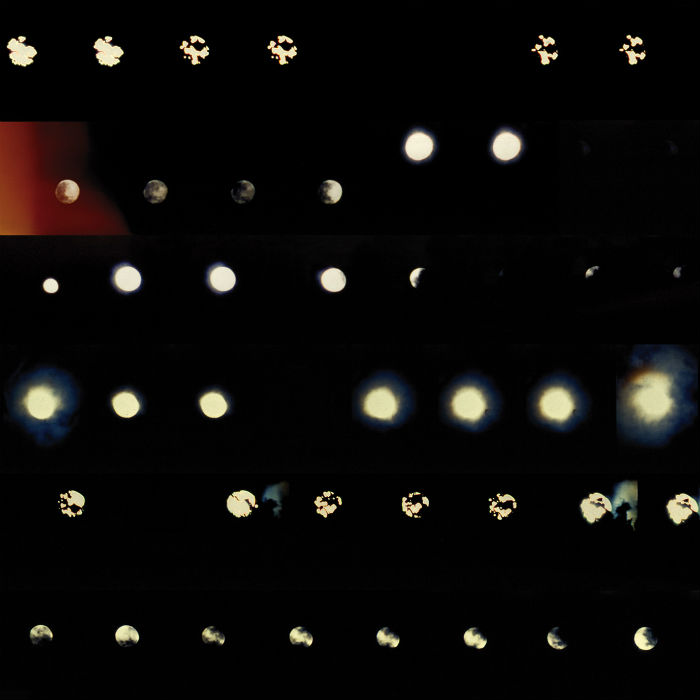Below, you’ll find a list of our favorite 30 releases of the last six months. Lots of fantastic albums just missed the cut (releases by ZS, William Tyler, Alan Licht, Aki Onda, Haino/O’Rourke/Ambarchi, Pete Swanson, Hair Police, D/P/I, coolmemoryz, etc.) and still others were too divisive to include on the list (Random Access Memories and Yeezus, in particular), but there is a LOT OF LOVE for the artists and albums that actually made the list. Similar to last year’s mid-year list, not all of the picks have full-length reviews, so look for new blurbs on albums by 18+, L. Pierre, Foodman, Stara Rzeka, and Inga Copeland. The rest are snippets from our original reviews, because you know, if you don’t think too hard about it, copying-and-pasting writing is sorta as cool as sampling music.
Pharmakon
Abandon
[Sacred Bones]

“Abandon is a sacrificial rite, one that thus brings to mind Teenage Jesus and the Jerks, but it’s not that it sounds like the No Wavers, exactly. Rather, there’s the same quality of a speculum scraping open the Id, transforming logos back into mythos. Chardiet shares Lydia Lunch’s confrontationalism, her need to make her audience uncomfortable, to evidence her contempt and nihilistic rejection of any connection except that in which suffering is inherent (which is all connections), to make the listener feel her pain with an impact visceral as well as aesthetic. ‘Pitted’s’ insistent thud might be the door of Lunch’s closet slamming shut, while in moments like ‘Ache’s’ hindquarters, there’s a certain soughing, defeated dreaminess, which gestures past ‘dark ambience’ (if I may use that awful phrase) to Nico’s frozen warnings. But let’s leave comparisons aside: Abandon’s hammering slow pneumatic-drill beats are not so much an all-out assault as a grueling siege, in which the beleaguered inhabitants of the psyche find themselves starving, barely existing in a rising cesspool of their own shit and vomit, ridden with epidemic disease, turning to cannibalism and to frantic final Decameronesque debaucheries.” [full review]
Mohammad
Som Sakrifis
[PAN]

“Mohammad consists of Nikos Veliotis, Costantino Kiriakos, and ILIOS, three artists from Greece who demonstrate their mawkish grit on cello, contrabass, and oscillators respectively. Som Sakrifis is their first release on PAN, and it holds the potential to literally drench its audience in uncompromising free-fall drone of the most miserable temperament. Whereas the term ‘drone’ may have been given questionable press of late, particularly in conjunction with misguided EBow experiments and ambient mediocrity, Mohammad pump it full of scorched engine oil and set the whole downhearted business ablaze. What prevails is the aftermath: a foul-tasting gust of smoke that pins one to the spot before forcing participation in some kind of hypnotic procession. Cards on the table: what we are dealing with here are three excruciatingly slow pieces of music that suggest the aforementioned instruments are being painstakingly abused. Som Sakrifis resides in a stygian realm between the flickering stars and the bioluminescent plankton that outline faraway ocean activity.” [full review]
Autre Ne Veut
Anxiety
[Software]

“More important than critical theory or semiotics is the simple fact that these songs work as pop. Anxiety would be a failure were it to come across as an academic exercise, a late-arriving dilettante’s attempt at the music of the masses. Its appeal should be obvious enough to anyone who hears it, but it is also easily understood that there are many barriers to enjoyment that mark this particular path. The histrionic emotionalism of Anxiety will turn off those put off by bombast. This is an understandable feeling. There are moments when I listen to Anxiety and feel repulsed by its intensity. That said, I never feel a lack of admiration for what it achieves, for the mood it evokes, sustains, and perfects. There is no moment wasted, no shout, no silence that is without meaning. This is art that undertakes no less a task than the comprehension of the meaning of life in a deeply contradictory era. The importance of this pursuit should not be diminished nor confused by matters of newness and oldness. After all, there is little more radical than criticism of the self. The lack of vanity, the frank way it strives for accessibility only serves to further magnify the greatness of Anxiety. It does the most ideal thing art can do: it tries to make sense of life itself, without pretense or guile.” [full review]
18+
MIXTA2E
[Self-Released]

MIXTA2E, the second release from the enigmatic “Boy”/”Sis” L.A. duo 18+, collects heard and unheard tracks released since their first mixtape, highlighting with frightening consistency the versatility and seductiveness of their ever-expanding music world. It’s not an easy one either. Sure, there are melodies: Sis offers disembodied, arm’s-length lullabies that sound like they’re read off a laptop screen, while Boy spits stuttering rap verses with a vacant, affectless urgency. And yes, there are rhythms too, many sourced from other artists, others possibly created in Logic. But the album comes off as blank and as artificial as the visual world they depict/portray/create in their videos (which are absolutely stunning, by the way), a simulacrum of sexuality repressed by the sterility of the virtual data stream, mimetic gestures of avatar flesh trapped in a perverse landscape where obsession meets fetishism meets emptiness meets violence meets love meets horror. What’s even scarier? This is only a snapshot of what these two are capable of.
Portal
Vexovoid
[Profound Lore]

Portal’s unique choice of mythos reflects in every layer of their being, all the way down to the costumes they wear. In its own way, Vexovoid is a kind of devotional music for Lovecraftian deities. But more importantly, it evokes them, unseating the listener’s expectations of stability and intelligibility and replacing them with horror and convolution. Their strangeness marks them out from more typical death metal bands, while still retaining their brutality and extremity, a distinction that results from the ideas that animate Portal’s work and their commitment to forming their music into a vehicle for the monsters to which they bow. Vexovoid refines these ideas into a more audible form, closing off the listener’s ability to escape it. Just don’t listen too closely or the structure might start making sense. [full review]
L. Pierre
The Island Come True
[Melodic]

Bibulous perv-poet Aidan Moffat brought his L. Pierre project out of retirement for one last job: a re-negotiation with a previous decade’s worth of unused samples and field recordings that brought about The Island Come True, a beat-tape of peculiar aches and inexplicable bruises. Waves break against keening orchestral flourishes; seagulls cackle over steepling melancholia; a child laughs; a woman exhorts; loops rise and fall like the tides. If the methodology chimes with The Focus Group’s uncanny excavations and reconstructions, the mournful swoon-and-crackle of the sonic carries liminal echoes of The Caretaker, Philip Jeck, and even William Bevan, himself no stranger to the art of DSP collage. The comparison may appear far-fetched, but Moffat and Bevan both tease a sepulchral pallor into a vulnerable glow. What passes for the warm breeze of a recently departed subway train in Burial’s work has here become something more disorientingly intimate: the warm cushion of a recently vacated toilet seat.
Dean Blunt
The Redeemer
[Hippos in Tanks/World Music]

“[You’d] have to be pretty thick to take Blunt at face value by now; his seeming embodiment and parody of celebrity worship has been a losing game for anyone trying to tidily summarize his persona, let alone his work. But The Redeemer does come across as something closer to honesty and warmth than anything we’ve previously heard or seen from Blunt, and where that first seems possible is (somewhat paradoxically) in the endless undermining, reframing, and rug-pulling of his own symbolic narrative. Billed as a start-to-finish relationship study, complete with a romantic, string-saturated prelude and dramatic solo piano closer, the actual story remains frustratingly out of focus, eluding interrogation with its strange syntax, genre meldings, and distinct lack of movement despite a dizzying back-and-forth emotional pull. The periodic voicemails, a potentially useful shortcut to clear exposition, are difficult to make out and proceed without much progression, as if the same vague sentiment is gradually decaying with repetition. If a ‘plot’ exists, it adheres to one of Ben Marcus’s preferred definitions: ‘small piece of ground,’ ‘setting,’ ‘the space in which a story occurs.’ The narrative is largely felt as a thematic trajectory, a cyclical journey from the first spark of love, to its erosion into parody, to its sudden renewal as understood through a glass darkly.” [full review]
Jenny Hval
Innocence Is Kinky
[Rune Grammofon]

“Like the actress Reneé Falconetti’s riveting confrontation with the male gaze in La Passion de Jeanne d’Arc, Hval’s work is most gripping when she confronts the aural equivalent of the male gaze, as in the fascinating ‘Mephisto in the Water.’ Upon first listen, it’s one of the prettiest songs on the album, composed of a wispy loop of piano, dusted with John Parish’s White Chalk and a simple, sing-song melody. There’s none of the lascivious whispering of the first track; instead, it sounds innocent, in a ‘Too much of water hast thou, poor Ophelia’ sort of way. The listener relaxes. Then, something odd begins to happen. Hval’s voice climbs and climbs in pitch. At first, it sounds like an idle, childlike game, in character with the rest of the song, but then it begins to go wrong. The childlike melody begins to tremble as Hval makes her voice climb octaves until it cracks, the vocal apparatus fails, and all we can hear is a vocalized squeak amid a gasp of air. The gap between word and voice becomes audible as articulation is lost. All that’s left is a quavering ‘ahh,’ the sound you make when your mouth is open for the doctor’s firm tongue depressor, the most open, receptive sound the mouth can make. The attentive listener is forced to reconsider their enjoyment of the song up to this point. This is much more interesting and confrontational than the disclosure that Hval watches porn, because it’s about the relationship between listener and singer, and not just a confession by the singer. Just by listening to the song, you are implicated. One considers how and why Hval is in this compromising position. One wonders when and how he ordered Hval to open up and say ‘ah.’” [full review]
RP Boo
Legacy
[Planet Mu]

“On first listen, you might be tempted to call Boo’s sampling tendencies ‘populist’ — the vocal tics and pop earworms on Legacy are ripped straight out the hyperlinked and gardenpath-trod 21st-century consciousness. Legacy boasts a cartoon hydra-head of uncanny anthropomorphic voices: the specter of R&B’s lost goddess Aaliyah, Tarzan’s weird yodel-scream, Bone Thugs-N-Harmony, that creepy little kid from that one Kung Fu movie that GZA sampled on Liquid Swords, Justin Timberlake, the ‘motivational speech’ from Full Metal Jacket, and, of course, the chorus of zen-focused battletrack mantras and dancefloor declarations gracing nearly every track, courtesy of Mr. Boo himself. In the hands of most DJs producers musicians, an audio collage as eclectic as the one on Legacy would dissolve into an incomprehensible mess of pop culture regurgitation, a chain of empty signifiers cloying for the listener’s attention. But RP Boo’s tracks dance in the space between entropy and subtlety so gracefully that every sample in Boo’s repertoire shows up at the precise right moment, always in fierce lockstep with drums and totally crucial to maintaining the music’s careful balance between chaos and forward momentum.” [full review]
Andrew Pekler
Cover Versions
[Senufo Editions]

“[On Cover Versions, Andrew Pekler selects] an assortment of images from exotica and library record covers and then manipulates their authorship in order to erase any symbolic affiliations with the past. […] These are scores produced at little expense, bled of authorship by those who benefited from the anonymous play-safe sounds that emphasize such questionable production. They come modified here in distorted forms, as twisted keys on ‘Seascape / Ship’ and a pulsating glitch on ‘Sunset / Sunrise’ that literally causes a tingling sensation in the esophagus. The fact that these tunes were so easy to come by in second-hand stores is an indication of their generic value today outside the confides of specific recognition. Pekler has ‘covered’ music formed within these bizarre fringes and manipulated it to create something utterly transfixing. Not only is he reworking the art forms of yesteryear for inquisitive audiences, but he is redefining the margins, crafting results in the guise of audio miniatures that tell anonymous tales of cultural shift channeled through long-forgotten voices that have never sounded so stirring.” [full review]
Nmesh
Nu.wav Hallucinations
[AMDISCS]

“Nmesh has a few different modus operandi on Nu.wav Hullicinations, the first of which is the Macintosh Plus-/Mediafired-inspired 80s and 90s pop re-imaginings; the second is the more corporate stock music pastiche of 情報デスクVIRTUAL, and finally there is the VHS tape collage (minus the video of course) reminiscent of recent Everything is Terrible releases and some tracks by The Books. At points, all three of these techniques coalesce, almost as if the listener were in a spacecraft 20 light years from Gaia, where the radio and TV frequencies from Earth’s not-so-recent past all converge on a single receiver attempting to play every channel simultaneously. The first track, ‘THΞ GΘΘSΞ IS LΘΘSΞ,’ epitomizes this strange ambiance, as bits of Berlin’s ‘Take My Breath Away’ mix with samples from the Tom Cruise fighter pilot film that made it such an iconic song. As the album continues, samples from 80s and 90s pop hits that include Billy Idol, Frankie Goes to Hollywood, Soul II Soul, and Cathy Dennis songs introduce a heavy nostalgic mode, which makes the insertion of candy/Barbie commercials excerpts and Super Nintendo sounds seem to organically flow out of the haze of childhood memory.” [full review]
Mark Templeton
Jealous Heart
[Under the Spire]

“Jealous Heart harbors just as much nostalgia for tape as The Caretaker’s Empty Bliss did for old ballroom 78s, and it explores that sentimentality in a similar vain: by confronting the styles and the format most candidly. On the record at hand, this is accomplished extraordinarily well through the hushed haze of ‘Matinee.’ The comparison also holds water in that, like James Kirby, Templeton is exploring states of change that people have no control over, such as aging. But each set of results is different, due mostly to the latter pursuing a contemplative angle as opposed to an investigative one. The music therefore reveals itself as insular because of the echoic and fetishist grip residing in the sluggish, looped vocals; the clicking of buttons; and the speeding of reels on ‘Once We Were Down,’ which fastens analogue whirring with ambient jazz trumpets. A physical relationship with the cassettes is demonstrated in their being used as a tool for summoning shaded textures in, say, an underground space. On ‘Kingdom Key,’ it appears as though the artist is scrunching the material in his hands as the spools are peeled across a manipulated vocal loop. There is nothing bleak or sinister about the concept; it exposes a humbling degree of exploration, propelled by the combination of electro-acoustic hashing and hollow vocal segments.” [full review]
Nick Cave & The Bad Seeds
Push The Sky Away
[Bad Seed Ltd.]

“Leave it to Nick Cave to actually bring something new to this well-worn artistic conversation. While not always deliberate, the repeated allusions to memory and shadows that run through Push The Sky Away show their relationship to modern analysis of the thematic problem presented in Lolita: the conflict of age and memory. Except that Cave’s representation illustrates the decay of permanently fixed memories, deteriorating willfully in the face of informational mounds and gluts, not Humbert Humbert’s poetic ooze of pedophilia, the contrast of the movement of age and the stasis of memory (or, as expressed by Proust in Time Regained: ‘Indeed nothing is more painful than this contrast between the mutability of people and the fixity of memory[…]’). Cave’s is that of memories in half-life in accelerating decay: ‘Wikipedia is heaven/ When you don’t want to remember anymore’ (‘We Real Cool’), or ‘You’re the best girl I ever had/ Can’t remember anything at all’ (‘Higgs Boson Blues’). Most of Cave’s characters have the Humbert/shadow problem, yet they exist in a time and space where memory is stored in data banks so that trivial facts (with their strange pertinence on ‘truth’) can be recalled without the space of the brain being required.” [full review]
Foodman
Shokuhin
[Orange Milk]

A personal effort to qualify Foodman’s music in a traditional category stemmed from fascination and bewilderment, as opposed to a need to neatly label things in over-arching genres — and that jarring sensation of listening to something relatable yet disconcertingly foreign became part of the joy of exploring Shokuhin (released on Orange Milk, co-run by ex-TMTer Keith Rankin). Although it sits in a semi-familiar microcosm somewhere between the twisted paranoia of Gobby and the sardonic faux-gangster stylings of Paisley Parks (with a hint of Oneohtrix Point Never’s replicant miniatures thrown in), it revels in its own aesthetic bubble, a bizarre and miasmic pseudo-Japanese paradise noticeably more vague than his contemporaries. Morphing ephemera into semi-lucid collages, one can almost spot a Shinjuku-bound ganguro sitting on the subway next to a onsen-ready businessman, or even a posse of giggling schoolgirls ogling Masaki Koh on a billboard — yet as this fetishized maximum turbo vista begins to settle, it vaporizes in a hazy jam of footwork-inspired nonsense that recalls RP Boo through clouds of joyous smog, an aesthetic kaleidoscope that drifts between dimensions and loosely gestures at its listener to adjourn to a dreamscape — proudly — “Made in Japan.” Welcome to the world of Foodman. ☯ ☯ ☯ ☯
Jerusalem In My Heart
Mo7it Al-Mo7it
[Constellation]

“Exposing a tendency for cultural interplay is what makes Jerusalem In My Heart such a vibrant live outfit. They have been performing for eight years as a trio consisting of Moumneh, Malena Szlam Salazar, and Jérémie Regnier — artists from Lebanon, Chile, and France, respectively. The project is a cross-pollination of lights, music, visuals, and experimentation that comes together in what has previously been referred to as an ‘immersive, visual and theatrical experience.’ Since the group’s inception, collective output has hinged on this startling exchange of ideas and mediums that bombard the senses, not only in presentation, but in a contemporary approach to folkloric and traditional Arabic music. Dispensing these aspirations onto a single release was always going to be a tricky business, as the enterprise consequentially forgoes some of its major attributes. However, the resulting album, which is comprised of Moumneh’s home recordings, brings to the fore a deeply penetrating realization as he focuses creative energy purely on songwriting and structure — this while incorporating those Syrian cassette aesthetics alongside some extraordinary buzuk renditions. […] Mo7it Al-Mo7it constitutes a gentle merger, a meeting of ideas that sets the pace for a creative partnership both deep-rooted and fruitful — a daring kick-start for an act brimming with promise.” [full review]
Tape Loop Orchestra
In a Lonely Place
[Fracture]

“Film, like tape, disintegrates. However, Tape Loop Orchestra’s is a presentation of decay (as in Decasia) rather than an exploitation of it (as in Basinski’s Disintegration Loops). In exploring the relationship between repetition and decay, Hargreaves talks about the eventual, temporal revelation of the fragile thing. When substance is broken down through repetition, you come closer to what is at the core of the thing itself. He continues, and I respect him for this: ‘There is perhaps a bigger question about the divide between good and evil but I don’t think I’m qualified to answer such things, especially with something as abstract as music.’ It’s not that, as Auden said of Yeats, that the work of art is unable to act, to speak. Rather, that it was never going to do anything in the first place but live and die. The process is what In a Lonely Place is about. Suffice to say, it is a gorgeous process: that is, the phrase, meticulously composed, looped, developed, and finally broken down. I’ll spare you the purple prose, but I highly recommend you listen to it. Hargreaves is a master at what he does, which is repeat himself. If you’ve heard previous work by Tape Loop Orchestra, or even his band, The Boats (whose Ballads of the Research Department was a personal favorite from 2012), you will already know that I mean this as a compliment.” [full review]
Wolf Eyes
No Answer: Lower Floors
[De Stijl]

Where past records pierced or bludgeoned, No Answer: Lower Floors seethes. It doesn’t assault; it worms its way in past your usual defenses. Its vocals are not shrieks of horror, but a monotone that splits into two voices, acting in both sides of the stereo field so as to enter twice into each ear. Perhaps the most frequently cited characteristic of Burned Mind was the ‘stabbing’ bass lines. Here, however, the bass is yet another paranoid thought in a mass of delusions. It’s not so much phantasmagoria as the onset of anxiety, the tension that swells in the muscles of your shoulders when the merest uncertainties have built into an overwhelming possibility. No Answer: Lower Floors in this way feels like Wolf Eyes’ most honest work to date. While the lyrical content might discuss themes of madness and transcendence on ‘Choking Flies’ (‘Lose your mind on an empty street/ Empty minds please stay asleep’), it’s the delivery that contains humanity. The relaxed tone renders the lyrics into casual idioms, containing only a suggestion of their former violence. Behind them groan the off-kilter but locked-in rhythms of the electronics and the atmospheric tremble of new member James Baljo’s guitar. ‘Chattering Lead’ and ‘Confession of the Informer’ showcase Wolf Eyes’ polished skills in these arenas. Each return of bass or synth line constructs a foreboding mood without the use of the more facile tactics of crescendo or sheer sonic battery. [full review]
Stara Rzeka
Cien chmury nad ukrytym polem
[Instant Classic]

Stara Rzeka is not mere genre-mashing. The long-form pieces on Cien chmury nad ukrytym polem glide from Americana compositions to beat electronics to black metal are executed with so much sprezzatura that they place their importance not on the genres themselves, but on the shared atmospheric qualities related within. In some form of miracle of execution, the intense transitions feel natural and somehow make sense of their opposites. But by the end of the album, even this point feels like a distraction for what’s happening here. Like the person interacting with nature, understanding the juxtapositions in context misses the point — or, as the writer Clara Lispector said about the egg, “To understand is proof of error.” So maybe this is why I am so attracted to it: my unfamiliarity, complete ignorance of the Polish language, my weak understanding of black metal, my non-existent encyclopedia on modern electronic music, or that drawing history to Fahey, circuits, and corpse paint seems useless — again, like the person interacting with nature.
The Knife
Shaking The Habitual
[Mute]

“Clocking in at 97 minutes, this 3xLP has not been recorded with the ease of amiable track-hopping in mind, its purpose built for a single sitting. Although that case could arguably be made for any other record out there, the combined length of each number on Shaking the Habitual operates as one of the project’s principal components: an embodiment of reexamining assumptions about the listening habits of The Knife’s own audience. Aside from obliging the listener to ingest an aural clusterfuck of liberated curiosity and compromise, Shaking the Habitual exists as a gateway to some of the most compelling, stimulating, and unrivaled music the outfit have released to date. Absorbing the girth of this behemoth in one fell swoop is rigorous and harrowing; one comes away feeling ruptured, dislocated from expectation but determined to listen again. It would be easy to dismiss the whole thing as pretentious drivel, a wanky charade both pointless and irrelevant — it’s a justifiable standpoint, but one that lays waste to any audacity or inventiveness. […] As an album designed to be consumed as a whole, Shaking The Habitual is exhausting. But the experience is unique…” [full review]
DJ Rashad
Rollin’[EP]
[Hyperdub]

“A winter’s night on Rinse FM, and Kode9 and Cooly G are at the controls for the monthly Hyperdub show. The next track comes in, and it’s pure fire: a carnival-time snare-roll loop just long enough to make you wonder if it will ever end, just long enough to make your stapes purr. […] Right on cue, something changes: the drums tangle and stall, rhythmic thread trapped in a zipper. A slim palette of minor chords, molded zig-zag to pitch; a kick drum’s epileptic thump scattered across the mix. The snares return, choppier, a shorter, truncated loop that’s got you by the hair. Kode9 takes the mic: ‘Yeah, out to the Teklife crew!’ Well, shit. Of course this is footwork, of course it’s Teklife-affiliated. This is the Hyperdub show, after all, and we all know a DJ Rashad EP has been in the pipes for a while. Now that you mention it, it couldn’t have been anyone else. Anyone else, that is, apart from Addison Groove, the nom de guerre first used by UK dubstep producer Headhunter when he tried his hand at (heavily, very heavily) footwork-influenced bass rave bangers. Anyone else apart from Pearson Sound, the UK dubstep producer whose ‘Work Them’ (produced under his now-retired Ramadanman alias) deliriously pressed B-more breaks into Chicago juke shapes. Anyone else, in fact: because who expected footwork to open out like this, to adjust its contours to these new international pathways? Make no mistake. ‘Drums Please’ and the rest of Rollin’ is still recognizably footwork. Only footwork got a job, moved out of its parents’ house, and makes eye contact when talking to strangers; it might even pay taxes. Footwork now goes to nightclubs in Europe, smokes kush with design students, represents the street in magazines they only sell in the shops in art galleries. Footwork left you, the no-fi ghetto fetishist, behind: you were holding it back, and tomorrow is a day that has footwork’s name written all over it.” [full review]
Gobby
Lantern [EP]
[UNO NYC]

“After stockpiling the serious clout he earned from percussion contributions at a Hype Williams show and for turning out mad batches of beat production for the likes of Mykki Blanco, each fresh Gobby EP comes projected by a cadence of critical intrigue. But while his infectious stream of free releases have generated potent clumps of online acclaim, Lantern is by far his most pugnacious outing yet. Instead of arranging a flamboyant affection for borrowed content, Gobby has jerked every sample through a heinous obstacle course of footwork while flexing abstract technical flair and pissing into a ferocious wind of commercial hip-hop. This is Hulk Hogan let loose on Cash Money, mashing his rant out in the wildest depths of the k-hole. […] Whoever this elusive character might be, he continues to demonstrate a pliable cunning within the genres that inspire, even if his samples are regarded as sloppy seconds as opposed to choice cuts.” [full review]
Inga Copeland
Higher Powers
[Self-Released]

There’s a great spiritual debt being waged in Inga Copeland’s Higher Powers mixtape. From its desolate beginnings of paying for hope with change, to submitting listeners to an empty and searing ting, Higher Powers immediately demands the audience’s attention, building a world around pronouns Inga addresses indistinctly. There’s direct reference to “places” and different cities during emotional change/follies/highing, but nothing for the listener to relate to out of the context of Inga’s internal perspective. Or maybe the “you” Inga is employing isn’t of a deity or god, but of a lover, someone who she has faith in making her both strong and worn. Perhaps Higher Powers, then, represent the works of monogamous romantic love for someone/-thing else, focusing entirely on the fluctuation between what is good and bad, and trying to find a sort-of conclusion within contradiction. Shit, less than that: could just be drugs, right? Straight up: Higher Powers. Feeling that rush of experiencing something somewhere, wherever, soaking in the scenic rays of this or that or over-there, breathing in the oh, wait I’ve been here before. Higher Powers are quite mysterious, eh? Like her previous works — her latest being Don’t Look Back, That’s Not Where You’re Going — Inga Copeland continues her love of broken pop, slimy dubbed-out basslines, and manipulated samples (@dee-dah-tah-tem). And she brings mad creative game. Follow Squeo’s lead: “download the whole thing right here: :o)”
Fear of Men
Early Fragments
[Kanine]

“Fear of Men’s influences include Anaïs Nin, Sylvia Plath, Freud (Sigmund and bonus points for Lucian), Jean-Paul Sartre, and Walter Benjamin. They wear these influences lightly but perceptibly, a translucent second skin. Bookishness may be another common indie trope, but, The Smiths aside, in a world where lyrics run somewhere between afterthought and cliché, to see inspiration of this caliber not only declared, but making its way into singer Jessica Weiss’ surrealist-confessional vignettes, is a pleasure that, in light of the subject matter, feels like it should be coupled with the term ‘guilty.’ But let’s be clear, the guilt is that of voyeurism rather than elitism: Fear of Men, by their own account, take their work ‘as seriously as you can take pop music,’ and that feels as it should be. As does the fact that Early Fragments is what it says on the box: a compilation (adorably described as ‘reverse chronological’) of pieces somehow fully formed yet still in the process of coming into existence, even if that box has been shredded into pieces fluttering to the ground, a phrase reflected too in cover art depicting dismembered Classical statuary. Oh, but there was one other act, enamored of Classicist imagery, who sunk deep into the literature of transgression and brought back what they found for our delectation, wasn’t there?” [full review]
SAINT PEPSI
HIT VIBES
[Keats//Collective]

“SAINT PEPSI might be conforming to the stylistic tropes of various appropriation techniques while testing the water as a self-proclaimed vaporwave musician, but the album’s success lies in the producer shedding any micro-genre attributes while bearing a concrete idea as to what he wants his final product to sound like. Of course, these were fantastic songs before they were included here, but the way they have been mixed with programmable synths and drum patterns, and the manner in which the record has been sequenced as a whole, makes for a stunning accomplishment. Sure, it’s upbeat and fast-paced in most places, but there are a couple of slow burners on here as well (the turn-the-lights-down hum of ‘Together’ and the gorgeous flow of ‘miss you’), which give the album astonishing energy as it feeds into Allen’s dialogue. With HIT VIBES, SAINT PEPSI has not only found a winning formula, but he has raised the bar for contemporaries toying in a similar domain. At a time when the concept of the ‘remix’ itself is being remixed, a shimmering new milestone has been chiseled from the vapor, and with his newly formed collective New Generation, the artist responsible shows absolutely no sign of slowing down.” [full review]
Burial
Truant / Rough Sleeper [EP]
[Hyperdub]

I’ve been trying to figure out why “majesty” is used so frequently by critics to describe the music of Burial. The word certainly implies a sense of beauty — and Burial’s work consistently possesses this quality — but I think that the connection goes even deeper. Burial’s music is majestic in the way that I imagine a dark, moss-covered, centuries-old cathedral to be majestic; to stand in the midst of its cavernous glory is to be confronted with something at once both otherworldly and awe-inspiring, something overwhelmingly grand and yet affecting on a deeply personal, intimate level. Never before has the producer’s music possessed more majesty than on this most recent release, Truant / Rough Sleeper. The EP’s two tracks — both of which unfold episodically — effectively expand on his well-defined aesthetic, exploring emotional terrain previously unseen in the producer’s oeuvre; up until this point, Burial’s work has been remarkably tonally consistent, relentlessly elegiac and introspective. While this ruminative quality still pervades Truant, moments on the EP prove that the same timbres and musical ideas that Burial has been developing for years can successfully communicate joy instead of melancholy, can reveal rays of light rather than obfuscate them. Truant / Rough Sleeper sees Burial sitting back and exploring the incredible depth — and, indeed, the sheer majesty — of what he has built.
Colin Stetson
New History Warfare Vol. 3: To See More Light
[Constellation]

“I can’t avoid reflecting on why the process through which Colin Stetson makes his music is so inextricably tied to the music itself, for I think this must be what accounts for the surprisingly wide appeal of his music, regardless of its inherent difficulty. Like Hendrix, his relationship with his instrument becomes as important as what he expresses through it. Not everyone is able to digest profound works of poetry, but success in art is undeniable, even for the uninitiated, when the action is the poetry, when what’s expressed is the means of expression itself. If Colin Stetson creates art through an instrument that is the art, then his music becomes creation itself: in the same way that Pygmalion breathed life into his ivory love, Stetson very literally breathes life into his instrument, and in turn, like the statue transformed from stone to flesh, his music softens our hardened selves — it reminds us that we were once made, too.” [full review]
The Flaming Lips
The Terror
[Warner Bros.]

“The Terror may be The Flaming Lips’ most concise statement to date. But it’s not clear whether they’re at the deep end of an oscillation or whether this is the logical end of all their work. There are few moments when love triumphs in the absurd back catalog, and when it appeared, Coyne always met it with questions and doubt. The Terror feels like certainty. It offers no hope but in terror: terror as joy beyond all reckoning, a junction of both fear and love, a purity that pours onto us after transgression. Coyne claims in the lengthy press material for the album that ‘the joy of life will not be at its zenith,’ that we must ‘go all the way in’ where we sense decay and smell shit, or ‘sit on the sidelines and watch.’ The greatest pain and the greatest joy might indeed be linked, or at least one may need to risk one for the rewards of the other. Don’t listen to this record hoping for new age tones of healing or a jubilant finale. ‘Sometimes what looks like the sunrise turns out to be an atom bomb,’ they said long ago. You will find no comedy here. Violence is always threatening, and the paranoia only deepens. But if you want to know what happens when the band that wrote ‘She Don’t Use Jelly’ finally abandons all hope and steps willingly into the darkness, here it is.” [full review]
Paisley Parks
Бh○§†
[Pan Pacific Playa]

“Over the past decade, a number of Japanese DJs and production crews have angled their sound towards Chicago footwork, juke, and Detroit jit. Throughout his terrific article on the expanding enthusiasm for it in Japan, DJ Fulltono discusses his obsession for the styles footwork encompasses. His fandom spans from 20 years of following the twisted path of Chicago House through ghettotech, while imitating the dance moves he saw on the net. It sets the scene perfectly for understanding why Бh○§† comes bound in such sweat-charged house bouts, as these like-minded practitioners follow the stylistic preferences of what Dave Quam once called a ‘mutation,’ which became ‘faster, uglier and even more hyper-localized’ as it ran its global course. […] Paisley Parks maintain a close relationship with the dancers who shimmy and shake to their rambunctious grooves, indicating an adherence to the principles of what they practice — this album is all about movement, which is quite spectacular when taking into account how knotty these tracks are to bounce to. But where it was once asserted that the Japanese were ‘chiming in’ to a conversation deemed otherwise out of their remit, they are now contributing to it substantially, not only in the international live bouts they engage in, but through producing some of the most mangled and addictive footwork to date.” [full review]
Dirty Beaches
Drifters/Love Is The Devil
[Zoo Music]

“Drifters/Love Is The Devil uses a similar format to David Bowie’s seminal Low (is there something in Berlin’s water?), but extends it to more than double the length, transforming Bowie’s withdrawal-inspired dystopia into the perpetuity of Hungtai’s personal diaspora. The success of this format leans heavily on contrast and juxtaposition on the second LP, and Hungtai’s inclination towards micro-symphonic, modern avant-garde heavily outweighs the corroded yet more traditional pop structures of the first LP. ‘We drift far, far from here,’ Hungtai croons as his last vocal contribution on the album in ‘Like the Ocean We Part,’ and in this, he seems to be suggesting why this contrast is congruous with the album’s overarching message: one’s surface self will always juxtapose one’s true, buried self, and to attempt to communicate with one’s buried self across this divide by way of language is utterly futile. Even more so, Hungtai implies that communicating your genuine, fated self at all through language is impossible, and at least partially proves this true through lyric-less yet devastating songs like ‘Love is The Devil’ and ‘I Don’t Know How to Find My Way Back To You.’ The concept of finding one’s way back is integral to the album, for the lasting effects of diaspora aren’t the result of one’s removal from their homeland, but of one’s removal from their recessed and permanent self — and then their being gated from that self. ” [full review]
Lucrecia Dalt
Commotus
[HEM]

“Wherever those influences stem from, the album is fascinating because its most cherished, spectral qualities are permitted to mingle with a textured friskiness, where the radiant sensuality of ‘Conversa’ is balanced alongside the jarring ploy of ‘Multitud’ and where the echoed finger clicking of ‘Esplendor’ is accompanied by a generous helping of vocal purr. Dalt’s voice sounds remarkable, by the way, particularly when pressing her darkest lyrics: ‘I’ve been doing deals with the devil,’ she confides over the subtle percussion underlay of ‘Turmoil.’ ‘Yeah, I’ve been doing business with the devil.’ Such moments amplify the Twin Peaks fixation somehow, that genial dicing of fine-spun skylarkery with outright horror, a portly fellow grooving down a school corridor and the announcement of Laura Palmer’s death on the principal’s PA system. Any feelings of warmth or comfort are kept at bay by the creepiness of what the material substantiates; it’s a difficult feat, but one that Dalt has achieved impeccably well. Commotus is an accomplished release that leads not towards a path of apocalyptic strife, but to a place both wonderful and strange.” [full review]
Full list:
Pharmakon - Abandon (Sacred Bones)
Mohammad - Sakrifis (PAN)
Autre Ne Veut - Anxiety (Software)
18+ - MIXTA2E (self-released)
Portal - Vexovoid (Profound Lore)
L. Pierre - The Island Come True (Melodic)
Dean Blunt - The Redeemer (Hippos in Tanks/World Music)
Jenny Hval - Innocence Is Kinky (Rune Grammofon)
RP Boo - Legacy (Planet Mu)
Andrew Pekler - Cover Versions (Senufo Editions)
Nmesh - Nu.wav Hallucinations (AMDISCS)
Mark Templeton - Jealous Heart (Under the Spire)
Nick Cave & The Bad Seeds - Push The Sky Away (Bad Seed Ltd.)
Foodman - Shokuhin (Orange Milk)
Jerusalem In My Heart - Mo7it Al-Mo7it (Constellation)
Tape Loop Orchestra - In a Lonely Place (Fracture)
Wolf Eyes - No Answer: Lower Floors (De Stijl)
Stara Rzeka - Cien chmury nad ukrytym polem (Instant Classic)
The Knife - Shaking The Habitual (Mute)
DJ Rashad - Rollin’ [EP] (Hyperdub)
Gobby - Lantern [EP] (UNO NYC)
Inga Copeland - Higher Powers (self-released)
Fear Of Men - Early Fragments (Kanine)
SAINT PEPSI - HIT VIBES (Keats//Collective)
Burial - Truant / Rough Sleeper (Hyperdub)
Colin Stetson - New History Warfare Vol. 3: To See More Light (Constellation)
The Flaming Lips - The Terror (Warner Bros.)
Paisley Parks - Бh○§† (Pan Pacific Playa)
Dirty Beaches - Drifters/Love Is The Devil (Zoo Music)
Lucrecia Dalt - Commotus (HEM)
